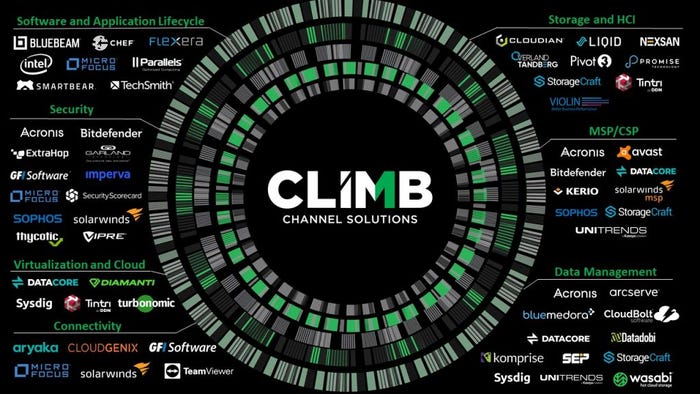Climb Channel Solutions Eschews Cisco, Dell EMC, Rebrands from LifeboatClimb Channel Solutions Eschews Cisco, Dell EMC, Rebrands from Lifeboat
Climb's line card consists of emerging players looking to take a bite out of more mature players.
July 7, 2020

If Lifeboat Distribution wasn’t on your radar, maybe Climb Channel Solutions should be. Climb is the rebranded and renamed, Lifeboat Distribution, a Wayside Technology Group company. While the company changed its name in May, two executives responsible for ushering in the distributor’s transformation joined the company more than two years ago.

Climb Channel Solutions’ Dale Foster
Dale Foster, CEO of Wayside, as of January 2020, initially came to Climb in January 2018 as executive vice president. Foster and Charles Bass, vice president, alliances and marketing at Climb, work together to redefine the company’s strategic direction and light a fire under what was a relatively inactive distributor.
It’s time to get to know Climb Channel Solutions and find out more about how the distributor is different from not only Lifeboat, but other distributors, and why partners might want to get to know Climb. To do that, Channel Futures chatted with Bass.
Channel Futures: So, goodbye Lifeboat Distribution, hello Climb. Why the rebranding and name change?
Charles Bass: We changed our name, but our parent company is still Wayside Technology Group, a publicly traded entity. That didn’t change. Lifeboat Distribution, which makes up the vast majority of revenue and gross margin at Wayside, wasn’t really a name that was tied to our strategic direction.
Lifeboat as a company had been fairly inactive. There were few boutique or specialty distributors left because everyone was acquired — except Lifeboat. That was because it was a distributor of last resort. They were essentially selling products that no one else wanted to distribute.

Climb Channel Solutions’ Charles Bass
So, when Dale and I came in, we changed the strategic direction of the company.
A New Direction
CF: What is Climb’s strategic direction today?
CB: The name change was precipitated on wanting to get away from the old name, but we also wanted to make connotations based on our strategic direction. We’re focused on emerging data center and cloud products. We’re in the business of incubating emerging brands in the U.S. and European markets.
Over 90% of our business is in the Americas, but we do some business in Europe.
Sign up for Channel Futures’ new EMEA newsletter, where we feature news and analysis involving companies based in Europe, the Middle East and Africa, as well as those doing business in that region. |
CF: Tell us more about these emerging brands that you’re incubating.
CB: Lifeboat’s strategy three years ago was basically following the market. They were picking up what wasn’t being handled by Synnex, Ingram Micro, Arrow and Tech Data. They were trying to out-execute the market with better operations.
 When [Dale] Foster and I came in, our contention was that being better at processing is like a bank saying, “We’re better at balancing your checkbook.” I’m not saying that’s not valuable, but the market doesn’t place great value on quote-to ship. The market values relationships and the ability to incubate, develop and sell through channels. And that’s what we started to do.
When [Dale] Foster and I came in, our contention was that being better at processing is like a bank saying, “We’re better at balancing your checkbook.” I’m not saying that’s not valuable, but the market doesn’t place great value on quote-to ship. The market values relationships and the ability to incubate, develop and sell through channels. And that’s what we started to do.
If you look at brand focus we have, I’m never going to sell Cisco. I’m going to sell Arista [Networks]. I’m not going to sell Dell EMC; [instead], I’m going to sell Cloudian. Everybody on our line card is an emerging player who is attempting to take a bite out of a mature player in the market with new and better technology.
Emerging Tech Focus
CF: What emerging technologies does Climb focus on?
CB: There are six categories that we chase. We’re trying to have between five to 10 brands in each of these six categories. We try to stay within our swim lanes.
The six categories are: storage and hyperconverged infrastructure; connectivity; security; cloud and virtualization; software and application lifecycle; and, data management/data movement.
Security is the one category that …
… really sticks out. Security makes up over half of our business. Our biggest player by a wide margin in security is Sophos. But we’ve also had success this past year with Imperva and, a new, young company is Security Scorecard. I mention them because they’re an example of a product that makes many our other products better. What the product does is give you a rating on the effectiveness of your security from an outside view looking in. And then they make recommendations to improve your security. That’s where other players such as BitDefender, Imperva and Sophos come in.
Cleaning Up the Line Card
CF: How does Climb’s line card differ from Lifeboat’s line card?
CB: I’ll take you back two-and-a-half years ago. Lifeboat just finished a $307 million year. The company [had] moderate single-digit growth and they transacted about 250 brands.
Fast-forward to today — we’re transacting approximately 120 brands, less than half the number compared to two-and-a-half years ago. We just finished our year at $601 million. Our growth has significantly increased.
We’ve done two things. We put in place an alliance process where we continuously pursue and onboard emerging brands. And we put in a process where we continuously evaluate the brands we have on our line card and remove them from the line card.
We’ve evaluated approximately 100 companies in the last two years and we’ve created contractual relationships with about 50 of them. We also terminated about 120 companies. So we’re refreshing the product line.
CF: What partners work with Climb?
CB: We transact at about 4,000 VARs a month. If you look at our business, about 50% of our business is in the DMR (direct market reseller) space. Companies like CDW, SHI, SoftChoice, Zones, etc., and 50% are what I call OEM/independent VARs.
Our average VAR is not trying to be the eighth guy in Kansas City selling NetApp. Our average VAR wants to be the first guy in Kansas City selling Cloudian. That’s our VAR. Every major metro has that counter-cultural VAR trying to differentiate his business based on their offerings. There’s a niche in every market for that.
Cloud Marketplace in the Works
CF: What about cloud offerings?
CB: We have some interesting virtualization/cloud companies on our line card. But the strategic direction for our company in the next 90 days is to launch a self-service cloud marketplace. The big distributors have all done this.
We made the decision six months ago to acquire a cloud marketplace that was better than we could build. And it allows us to acquire that expertise.
CF: What’s the best way for partners to get to know Climb Channel Solutions?
CB: When we came on board, this was an operations-focused company. There were zero outside salespeople. We brought in eight sales guys that we pay like a VAR rep. The way they get paid is they get a slice of the gross margin they drive in their territories.
We have a very different sales mentality now. Before we were a processing company; now we’re a sales company.
The best way for any VAR to know us is to know our outside sales team. We bought Interwork [Technologies] because we wanted some of their DNA. They had a couple of outside sales guys, but they had inside sales people that were outbound. They did a great job using tools to aggressively sell into their VAR base and manufacturer base.
About the Author
You May Also Like


